
Campaigners are calling for local abattoirs to be recognised as a public good as they are the 'linchpins' of the UK's food systems.
There are now only 56 small red meat abattoirs left in the UK, with a third having closed between 2007 and 2017 and a further seven closing in 2018.
Campaigners at the Oxford Real Farming Conference highlighted how local abattoirs ensure traceable meat production and multiple public goods associated with local food.
The findings of a survey by the Campaign for Local Abattoirs shows a sector under pressure. One owner described running the business as a “continual struggle”.
None of the abattoir owners surveyed considered their profitability to be ‘good’, whereas half of them described it as poor, and over 10% said they were making a loss.
This is due in part to a combination of high running costs and, with a growing move away from using natural animal by-products and towards synthetics, a collapse in the value of products that had previously provided income, particularly hides and skins.
President of National Craft Butchers and small abattoir owner, John Mettrick said: “Recently we slaughtered 89 lambs but received only 10 pence each for their skins, in addition to being charged £1 each for 12 that were damaged.
“This resulted in us actually making a loss for something that in my father’s day would have generated about £500 in profit.”
On top of this loss, small abattoirs must pay £800-£1000 per month to have their waste taken away. This has a knock on effect for farmers and retailers as abattoirs have no choice but to pass on these costs.
'Protect and enhance'
Nick Allen, Chief Executive of the British Meat Processors Association, called for recognition that small abattoirs are “the sharp end of the market and a useful alternative to relying on mainstream outlets, which can often mean big retailers dominate. We need to keep as many open as possible.”
The crux of the issue is the need to 'protect and enhance' local food systems, according to Peter Greig of Piper’s Farm, who said: “We need to believe in the future of relocalised markets.”
Patrick Holden, Chief Executive of the Sustainable Food Trust, said: “We can only bring change if we can touch the hearts and minds of the public. We need a campaign looking at how far animals have to travel to slaughter and bring this issue to the attention of consumers.”
To fully address this problem 'urgent government action' is needed, according to Lady Parker who chaired the session at the Oxford Real Farming Conference. She said: “All participants agreed that small abattoirs cannot survive in the current economic climate unaided.
“They will only have a sustainable future if it is recognised that they provide a vitally important service, and they receive financial support to subsidise some of the excessive costs they currently face, based on the concept of public support for the public good they provide.”
